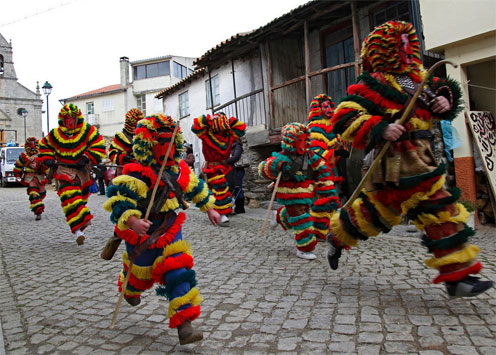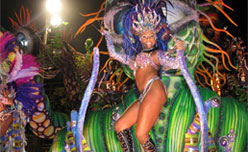Carnival in Portugal
The festive period preceding Lent is one of the most joyful times of the year in the countries of strong Catholic tradition and Portugal is no exception.
Carnival parades in Torres Vedras, an hour drive from Lisbon
Carnival celebrations usually take place in February or early March (depending on the liturgic calendar) and are a manifestation of joie de vivre, before the times of penance, repentance, prayer (and fasting) of the Lent.
The origins of the word ‘carnival’ are derived from the word ‘carne’, meaning ‘meat’ and according to the most common interpretation, Carnival is a farewell to meat, traditionally prohibited during the Lent. In a broader sense, the self-denial of the Lent extends to all the pleasures of flesh.
Despite local variations, the common characteristic of Carnival are costume parades and street, as well as private parties, with the abundance of food and alcoholic beverages. The festivities involve music, dancing and colourful outfits, but often also social satire.
Rio de Janeiro is home to world’s most famous Carnival celebrations. The lavish displays of samba schools, the grandiosity of firework displays, the abundance of related events and the extent to which the festivities involve the locals are unequalled.
In Portugal Carnival is celebrated with less pump and circumstance, nevertheless it is still an important occasion. Those who do not make use of the school holiday, granted during the Carnival period, to travel, often opt for joining in the celebrations.
There are a few places in Portugal where Carnival is observed with a special pomp and circumstance. None of them is Lisbon or Porto, a few, however, are within a short drive.
Carnival celebrations near Lisbon – Torres Vedras and Loures
The town of Torres Vedras, located approximately 32 miles north of Lisbon is home to one of the most prominent Carnival display in continental Portugal. Apart from the considerable dimension – the celebrations attract around 40 thousand participants and spectators – Torres Vedras carnival is interesting also because of its close ties to the Portuguese tradition of matrafonas – men dressed as women and cabeçudos – dress-ups with unproportionally large heads.
The festivities in Torres Vedras are usually held for around a week.
Even closer to the Portuguese capital, and actually within the Greater Lisbon area, you can participate in Carnival celebrations of Loures. The Loures neighbourhood is located north of Lisbon city centre and carnival parades have been held here since the 30s.
Estarreja Carnival in central Portugal
The small town of Estarreja, located approximately 10 miles north of Aveiro and some 160 miles north of Lisbon, is known for its displays of samba dancing during Carnival, much resembling the ones from Rio (although with much harsher weather conditions…).
Portuguese folklore at its best – Carnival de Podence
Should you be visiting Northern Portugal in February, do not miss out on the fascinating Carnival celebrations held in a small village of Podence, in the north-western corner of the country, approximately 125 miles from Porto.
The main stars of Canival festivities here are mysterious, folkloric figures, known as Caretos de Podence. Dressed in striped, colourful costumes and red masks, caretos are believed to be of a Celtic origins. In a curious ritual, they run through the village, making mischief and chasing young girls.

Caretos de Podence – Carnival tradition in Northern Portugal
Carnival de Funchal, Madeira
The capital of the Portuguese Madeira island on the Atlantic Ocean is known for many quite spectacular festivities. Apart from the Flower Festival and the New Year’s firework display, Funchal will surely please your eyes during Carnival.
Although strongly rooted in Portuguese folklore, the Madeira Carnival ‘borrows’ a lot from the tested and proven Brazilian tradition. Apart from the folkloric figures of trapalhão, whose role is to mock society and contest authority, you will be able to see mesmerising samba school parades.


